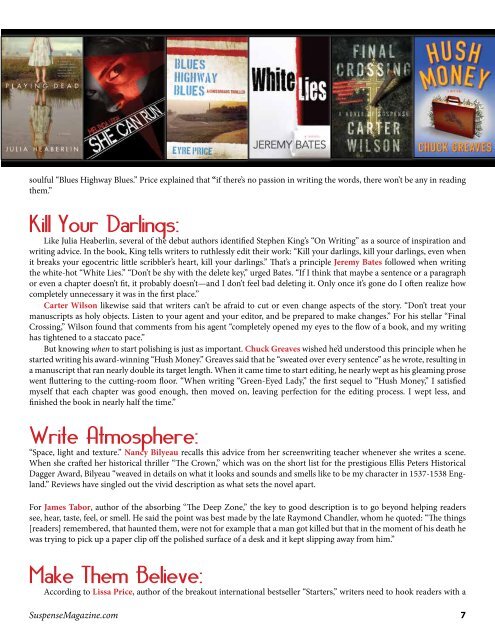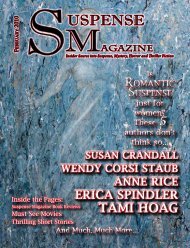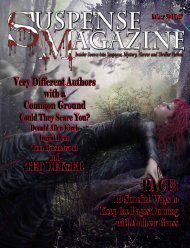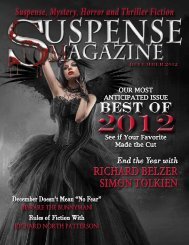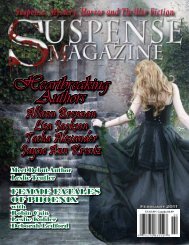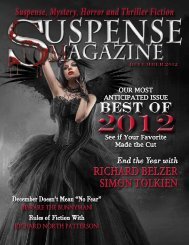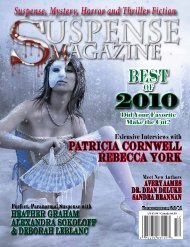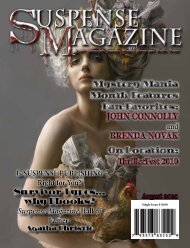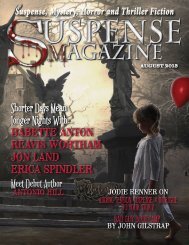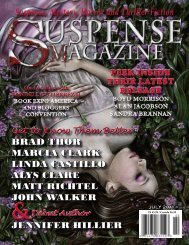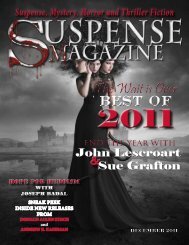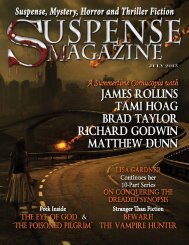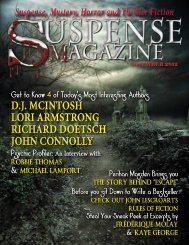Suspense, Mystery, Horror and Thriller Fiction - Suspense Magazine
Suspense, Mystery, Horror and Thriller Fiction - Suspense Magazine
Suspense, Mystery, Horror and Thriller Fiction - Suspense Magazine
Create successful ePaper yourself
Turn your PDF publications into a flip-book with our unique Google optimized e-Paper software.
soulful “Blues Highway Blues.” Price explained that “if there’s no passion in writing the words, there won’t be any in reading<br />
them.”<br />
Kill Your Darlings:<br />
Like Julia Heaberlin, several of the debut authors identified Stephen King’s “On Writing” as a source of inspiration <strong>and</strong><br />
writing advice. In the book, King tells writers to ruthlessly edit their work: “Kill your darlings, kill your darlings, even when<br />
it breaks your egocentric little scribbler’s heart, kill your darlings.” That’s a principle Jeremy Bates followed when writing<br />
the white-hot “White Lies.” “Don’t be shy with the delete key,” urged Bates. “If I think that maybe a sentence or a paragraph<br />
or even a chapter doesn’t fit, it probably doesn’t—<strong>and</strong> I don’t feel bad deleting it. Only once it’s gone do I often realize how<br />
completely unnecessary it was in the first place.”<br />
Carter Wilson likewise said that writers can’t be afraid to cut or even change aspects of the story. “Don’t treat your<br />
manuscripts as holy objects. Listen to your agent <strong>and</strong> your editor, <strong>and</strong> be prepared to make changes.” For his stellar “Final<br />
Crossing,” Wilson found that comments from his agent “completely opened my eyes to the flow of a book, <strong>and</strong> my writing<br />
has tightened to a staccato pace.”<br />
But knowing when to start polishing is just as important. Chuck greaves wished he’d understood this principle when he<br />
started writing his award-winning “Hush Money.” Greaves said that he “sweated over every sentence” as he wrote, resulting in<br />
a manuscript that ran nearly double its target length. When it came time to start editing, he nearly wept as his gleaming prose<br />
went fluttering to the cutting-room floor. “When writing “Green-Eyed Lady,” the first sequel to “Hush Money,” I satisfied<br />
myself that each chapter was good enough, then moved on, leaving perfection for the editing process. I wept less, <strong>and</strong><br />
finished the book in nearly half the time.”<br />
Write Atmosphere:<br />
“Space, light <strong>and</strong> texture.” nancy Bilyeau recalls this advice from her screenwriting teacher whenever she writes a scene.<br />
When she crafted her historical thriller “The Crown,” which was on the short list for the prestigious Ellis Peters Historical<br />
Dagger Award, Bilyeau “weaved in details on what it looks <strong>and</strong> sounds <strong>and</strong> smells like to be my character in 1537-1538 Engl<strong>and</strong>.”<br />
Reviews have singled out the vivid description as what sets the novel apart.<br />
For James Tabor, author of the absorbing “The Deep Zone,” the key to good description is to go beyond helping readers<br />
see, hear, taste, feel, or smell. He said the point was best made by the late Raymond Ch<strong>and</strong>ler, whom he quoted: “The things<br />
[readers] remembered, that haunted them, were not for example that a man got killed but that in the moment of his death he<br />
was trying to pick up a paper clip off the polished surface of a desk <strong>and</strong> it kept slipping away from him.”<br />
Make Them Believe:<br />
According to Lissa price, author of the breakout international bestseller “Starters,” writers need to hook readers with a<br />
<strong>Suspense</strong><strong>Magazine</strong>.com<br />
7


